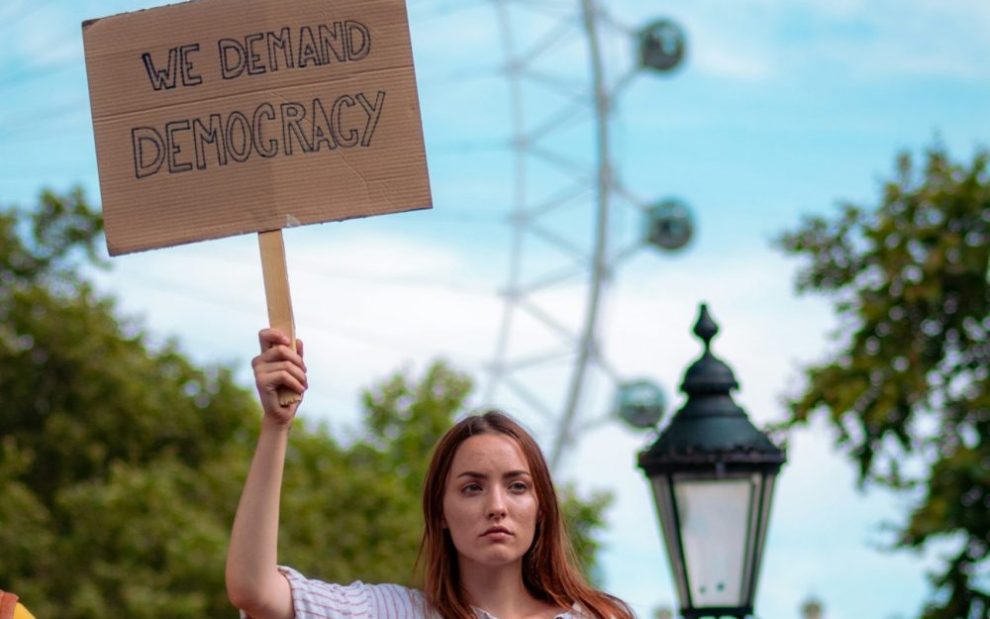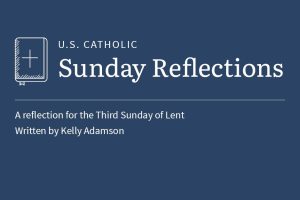There seems to be a prevalent sentiment amongst Catholics in the United States—the feeling that we don’t fit in with either political party and thus have to choose the “lesser of two evils,” write in a third party candidate, or sit this election out. As a public theologian, I understand the sentiment in theory: Neither prominent party fully expresses our social values. But it is irresponsible to wield this sentiment as an excuse for political inaction—or to generate a false equivalency between our choices.
To say we don’t fit in anywhere is to acknowledge that we do not idolize a particular political party or figure. It is to recognize that we live in a fallen world, that people make harmful choices, and that even our best efforts at fostering justice will fall short, so we ought not put our hope in political actors. It is to maintain a sense of humility and common humanity that can help us stay in relationship rather than ostracizing those evil “others.”
But this is not to say that in particular moments in history, we cannot discern the reality facing us and explicitly and resolutely decry the dangerous and manipulative violations of dignity perpetrated most prominently by one particular side. A “lesser of two evils” approach easily leads us to despair or inaction. As Pope Francis warns in Fratelli Tutti (On Fraternity and Social Friendship), “the best way to dominate and gain control over people is to spread despair and discouragement, even under the guise of defending certain values.”
It may be the case that Catholic principles invite us to critique both parties for various policy positions. Often, abortion and immigration are raised as examples of this quandary. We have observed Donald Trump and JD Vance foment hostility and violence toward immigrants of color through racist lies and fearmongering as a centerpiece of their campaign, and we have heard the Harris-Walz campaign pledge to affirm reproductive rights. Importantly, though, while the Trump-Vance campaign is promising mass deportations if they are elected, Harris and Walz are not promising more abortions. In fact, we know that although Harris and Walz might be reluctant to call for reductions in abortion, the policies they are proposing will bring abortion rates down—health care and family leave, anti-poverty legislation, housing assistance and others have all been shown to reduce abortion rates more effectively than anti-abortion legislation itself (which actually tends to have the opposite effect). In other words, even these seminal issues are not as clear cut as we are often led to believe.
More importantly, Catholics can disagree about particular policies related to issues of concern, but without stable democratic institutions we will be unable to express those disagreements or engage in productive dialogue. This is why the overt threat to democracy that Donald Trump and the MAGA movement pose—from trafficking in lies and misinformation to fomenting political violence and racism, politicizing independent institutions such as news media and FEMA, suppressing votes in marginalized communities, and threatening military action against “enemies within” (and naming specifically a sitting member of Congress)—requires Catholics to say enough is enough.
We are at a critical moment in history, and we, the church, cannot hide behind both-sidesism in the name of being Catholic.
Catholics should take sides. Even Jesus took sides often. For example, at risk to himself, he stepped in to advocate on behalf of a woman accused of adultery. Noting that “both sides” of this encounter had sinned, he nevertheless ensured that those with power did not use it to harm the marginalized person. The power differential is a critical piece of discerning which side to take: Am I standing on the side of the oppressor or the oppressed? It is important to note, too, that white Christians are the most likely to report fear of persecution but the least likely to experience it in the United States. This disconnect should generate serious self-reflection as we discern whether our political engagement demonstrates solidarity with the most marginalized or is rooted in selfish (and distorted) concern.
As we are discerning, Pope Francis offers some questions to help: What will this accomplish? Why? Where? When? How? For whom? What are the risks? What are the costs? Who will pay those costs and how? And in this election, we can look to history for guidance. The church bears the shame of its overall silence in the 1930s regarding Hitler’s rise to power and the depravity of the Nazi regime, and the parallels to this political moment are evident. Christians must not make the same mistakes.
It is important to note that according to a recent National Catholic Reporter poll, Catholics of color overwhelmingly support Vice President Harris in this election, while white Catholics overwhelmingly support Trump. This is significant: In the United States, white people who band together to counter the influence of people of color have never been on the right side of history. But further, our faith calls us to promote the well-being of those most likely to be marginalized and made vulnerable to exploitation by our political systems. Especially in light of the fact that the MAGA movement has been propped up by Christians—again, primarily white Christians, who make up more than 70 percent of the Republican party in a continuation of the white flight from the Democratic party after the Civil Rights Act of 1964—those of us who are not on board with the MAGA movement must take a stand, clearly and emphatically, on the side of justice.
We are called to bear witness to truth and love, in solidarity with the most marginalized, and this often means taking sides. We can get back to debating policy if our democracy holds—and whether it will depends on which side we choose.
Image: Unsplash/Fred Moon















Add comment